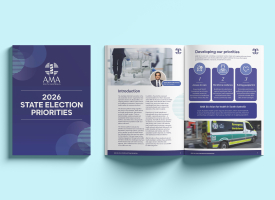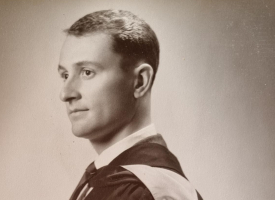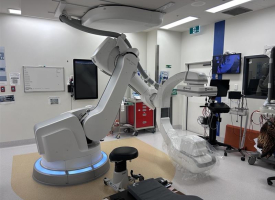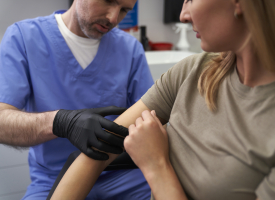Beyond the glass ceiling
AMA SA Board Member and Councillor Dr Emily Kirkpatrick hosted AMA SA’s Women in Medicine Breakfast and says the event sparked important conversations about equity, recognition, and the future of inclusive leadership in medicine.

On Thursday, 4 September, over 100 health professionals gathered for the inaugural AMA SA Women in Medicine Breakfast. The energy in the room was electric as clinicians, students, policymakers and leaders came together to celebrate women’s contributions to medicine and to reflect on the systemic changes still required to achieve leadership equity.
It was an absolute honour to open the discussion by setting the scene. We know that women now make up around 75% of Australia’s healthcare workforce, yet they hold only 25% of leadership roles. The disparities at senior levels remain significant, with only 28% of medical school deans and 12.5% of hospital chief executives being women. It’s important to note that South Australia is shifting this figure nationally, with a high proportion of female CEOs.
Our panel featured three remarkable leaders: Dr Melanie Smith, GP and digital health innovator; Dr Susan Neuhaus AM CSC, surgeon, former Army Colonel, and published author; and Dr Alecia Macrow, GP and women’s health advocate. Each offered honest, powerful reflections on their journeys and the barriers women in medicine still face.
Dr Smith, who started her career in software engineering, candidly discussed navigating male-dominated workplaces and the persistence of imposter syndrome.
‘Even when we are qualified and capable, those doubts can creep in,’ she said, resonating with many in the room.
Dr Neuhaus shared her experiences training and serving in what she called ‘two of the biggest boys’ clubs’ – the Australian Army and the Royal Australasian College of Surgeons. She reflected on how far South Australia has come.
‘The world has changed since then … and South Australia has been an absolute leader,’ she said.
‘This state has taken great pride in advancing women, from being the first state to give women the vote.’
She also highlighted small but meaningful changes, like the Women’s and Children’s Hospital leading discussions nationally to remove the ‘Mr’ and ‘Miss’ honorific for male and female surgeons so that all doctors are recognised equally as ‘Dr’.
Dr Macrow addressed financial inequities embedded in the system, noting that female GPs often spend longer with patients, particularly in mental health and antenatal care, but are penalised under the current Medicare structure.
‘Sometimes we do things differently than our male colleagues, in the way we work and connect,’ Dr Macrow said. ‘That time matters to patients,
but it can cost us financially.’
The discussion made clear that inclusion isn’t just about fairness, it’s about professional excellence and looking outside the workplace at broader policy to support our non-work life. We know that diverse leadership results in stronger teams, better decisions and improved patient outcomes.
As the session concluded, AMA SA President Associate Professor Peter Subramaniam and outgoing CEO Nicole Sykes reflected on the importance of elevating women’s voices.
‘The AMA is an amazing platform of inspiring people,’ Ms Sykes said. ‘In my time here, I have been inspired by women and their stories... I can’t stress enough the importance of elevating others.’
I’d like to acknowledge the Women in Medicine Breakfast sponsors, Doctors Health Fund, MIGA, Radiology SA, Avant and Quintillion Concierge, who believed in AMA SA’s vision. This breakfast marked only the beginning. The conversations will continue, within our workplaces, committees, and communities. AMA SA is committed to ensuring we work towards supporting the next generation of women in medicine, not only to take their seats at the table but also to help shape it.
*Photographer: Meaghan Coles Photography



